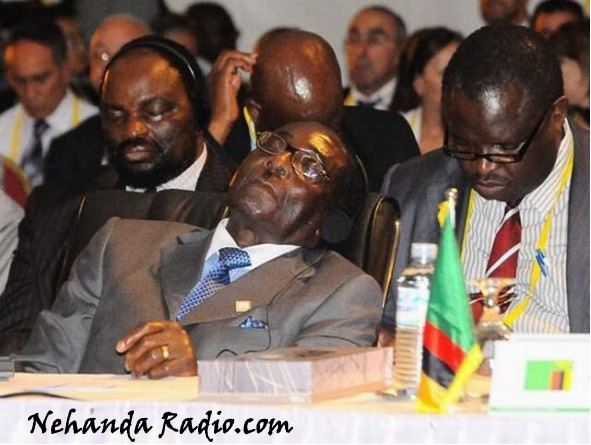By LLoyd Mbiba and Fungi Kwaramba
HARARE – Zimbabwe is teetering on the brink of total chaos as the country’s increasingly clueless government, led by an often-absent President Robert Mugabe, fails to respond to the many challenges facing hard-pressed citizens, analysts and opposition parties said.

They also told the Daily News that the rising incidence of protests against oppression and Zimbabwe’s calamitous economic collapse, did not bode well for peace and security in the country — pointing to the waves of protests by angry students, prisoners and ordinary villagers who are taking the law into their own hands in a desperate endeavour to improve their lot.
And to show how dire and seriously tense the atmosphere has become over the past few months, police officers were on high alert and in large numbers on the streets of Harare yesterday, apparently under instruction from panicking authorities who fear that major public disturbances may be in the offing countrywide.
The analysts who spoke to the Daily News were generally agreed that the country is teetering on the brink of total anarchy, with some of them accusing Mugabe and his administration of “sleeping on the job” while enjoying huge perks.
Senior researcher with the Human Rights Watch, Dewa Mavhinga, said the ongoing mass demonstrations around the country were “symbolic protests” against the abuse of human rights in the country.
“Recent developments in Zimbabwe are exposing the political stability facade that has been masking the Zanu PF government’s failure to respect basic rights and uphold the rule of law.
“These developments will put to serious test the sincerity and commitment by Mugabe’s government to ensure that Zimbabweans enjoy their constitutional rights. While revolutions are difficult to predict, what is clear is that there is a gradual coming together of different groups and Zimbabweans from all walks of life and political persuasions with one demand in common, that is to have a government that puts the interests of the people first,” Mavhinga said.
Political commentator Maxwell Saungweme said the ongoing protests were a clear sign of anger among the populace.
“People are angry against the current state of affairs. These riots and protests look like disjointed individual events, but the truth is they are a reflection of anger among the people that has been suppressed for long and has reached boiling point.
“The government may succeed in quashing some of these singular protests, but the truth is if things continue as they are, there will be mass protests covering the whole country,” he said.
With Mugabe once again away in the Far East, Saungweme, added mockingly that “the country’s monarchy is out of touch with reality and what they need to do to resolve problems at home”.
“However, you cannot blame him (Mugabe) for this, as he is of advanced age,” he added ruefully.
Former Finance minister, Tendai Biti warned that “the chickens have come home to roost” as Zanu PF, crippled by its vicious factional and succession fights, struggled to deliver on bread and butter issues.
“The ruling party has a clear deficit of leadership. What is affecting our people most is the excruciatingly low standards of living that they find themselves in.
“Our people are literally eking a living from hand to mouth. Right now the chickens have come home to roost. The government of the day cannot pay government wages, and the government has not paid salaries to grant-aided State institutions, which include colleges and universities,” Biti said.
Paralysing strikes, reminiscent of the wave of demonstrations last seen in the 1990s, have hit institutions of higher learning and Chikurubi Maximum Security Prison, where inmates recently mutinied demanding better food and living conditions.
At least five prisoners have died from the disturbances, after law enforcement agents allegedly opened fire to quell the unprecedented riot.
In Matabeleland, irate villagers also recently took the law into their own hands as they stopped a senior official from the dreaded Central Intelligence Organisation (CIO) from annexing Maleme farm in Matobo.
But instead of addressing the mounting challenges that include 90 percent unemployment, hunger and a crippling liquidity crunch, the Zanu PF government has employed heavy-handed methods to silence dissent, observers say.
Although government denies any hand in the disappearance of anti-Mugabe activist Itai Dzamara, civil society and opposition parties insist that the State is behind the abduction.
“We have a government paralysed by indifference, a government paralysed by cluelessness, a regime that has no solution to the present crisis.
“We have a leader in the form of President Mugabe, a leader who is not fit physically and otherwise to lead the country. It is even sad that members of the close family are now chaperoning him wherever he is making his escapades,” Biti said.
MDC spokesperson, Obert Gutu, said Mugabe could afford to go out of the country when the situation is going out of hand because he did not care about the suffering of the people.
“Robert Mugabe does not lose sleep because the majority of Zimbabweans are suffering. He lives in his own isolated world.
“Remember, this man has always been a loner even as a young boy herding cattle in rural Zvimba back in the day. Over the years, he has developed a very thick skin. He will soldier on,” Gutu said.
But Piers Pigou, project director at the International Crisis Group, said the fragmentation among opposition parties made it difficult for them to harness the pent-up anger among Zimbabweans.
“These (mass actions) appear to be spontaneous and organic responses to varying issues and pressure points on the Zimbabwean social, economic and political landscape.
“They do not translate into an organised revolutionary phenomenon … it does, however, reflect some of the mutating and ongoing struggles relating to land tenure, job security, law and order and the deficits in institutional integrity in Zimbabwe,” he said.
Source: Daily News






